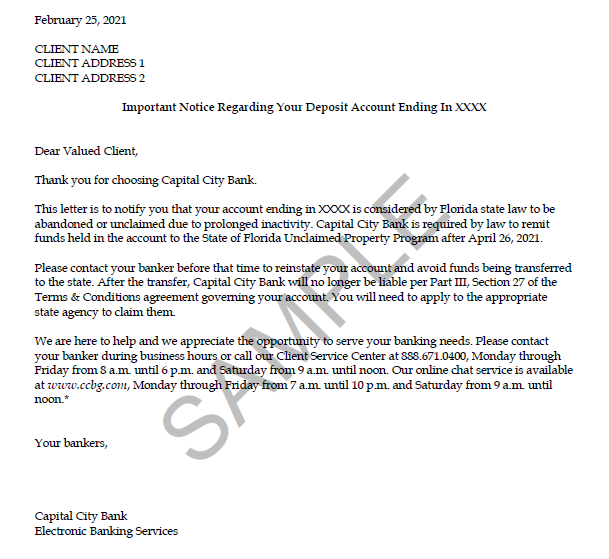An escheated account is an account that is unclaimed or abandoned due to prolonged inactivity and the contents have been turned over to the relevant state authority. All states have different dormancy periods (no owner-generated activity or contact) before an account is remitted for escheatment. State statutes dictate specific timelines for when unclaimed or abandoned account property becomes escheated. State statutes can alter the specific timelines at any point in time.
The current dormancy period for Florida, Georgia, and Alabama are as follows:
Florida
| Services | Number of Years |
|---|---|
| Checking account | 5 Years |
| Savings account | 5 Years |
| Cashier checks | 5 Years |
| CD Interest payments | 5 Years |
| Expense checks | 5 years |
| Money orders | 7 Years |
| Mortgage servicing | 5 Years |
| Residential lending | 5 Years |
| Loan Servicing escrow | 5 Years |
| Payroll checks | 1 Year |
| Safe Deposit Box | 3 Years |
Georgia
| Services | Number of Years |
|---|---|
| Checking account | 5 Years |
| Savings account | 5 Years |
| Cashier checks | 5 Years |
| Money orders | 7 Years |
| Expense checks | 5 Years |
| CD Interest checks | 5 Years |
| Safe Deposit Box | 2 Years |
Alabama
| Services | Number of Years |
|---|---|
| Checking account | 3 Years |
| Savings account | 3 Years |
| Money orders | 5 Years |
| Cashier checks | 3 Years |
| Safe Deposit Box | 3 Years |
Before an account is escheated, Capital City Bank sends a due diligence letter to the account holder's last known address. To avoid escheatment, clients are advised to initiate activity on the account (for example: deposit, withdrawal, transfer, and updating contact information) within 30 days of the date of the letter.
Clients who contact our offices can request to reinstate their account and avoid funds being transferred to the state. See Reactivating Dormant Accounts.
Sample Due Diligence Letter

Once an account is escheated, clients can be directed to the relevant state authority for unclaimed property. See Florida, Georgia, or Alabama unclaimed property websites for more information.
Best Practice: Associates must always encourage clients to keep their accounts active and updated. Associates are required to review the client's current information and update it accordingly.